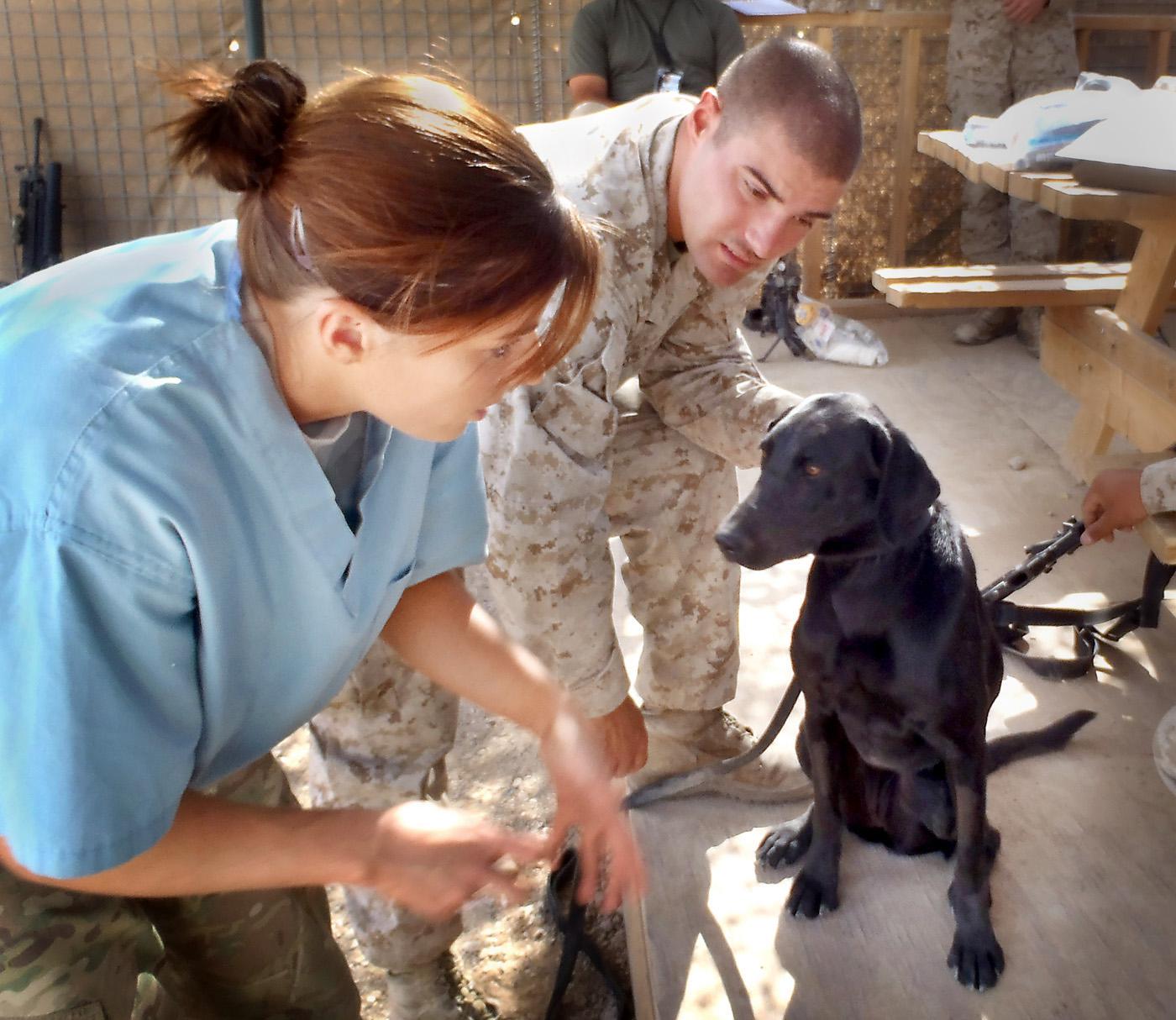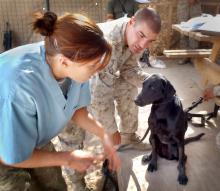Information Possibly Outdated
The information presented on this page was originally released on September 29, 2011. It may not be outdated, but please search our site for more current information. If you plan to quote or reference this information in a publication, please check with the Extension specialist or author before proceeding.
MSU Army veterinarian keeps K9 soldiers healthy
MISSISSIPPI STATE – Dr. SaraRose Knox is a 2010 graduate of Mississippi State University’s College of Veterinary Medicine and an Army captain deployed in Afghanistan who keeps working dogs healthy and ensures safe food for troops.
Knox, from Brookfield, Mass., has worked with animals since she was 15.
“I have always found a sincere enjoyment when working with animals, and I have wanted to be a veterinarian since I was a young child,” Knox said. “I’ve felt a connection with all animals and wanted to provide care to these patients that bring so much joy to our lives and ask so little in return.”
In school, she ran track and played field hockey. While in high school, she started work as a kennel attendant at a veterinary clinic. She worked at that same practice for eight years and was eventually promoted to technician. At the same time, she earned an associate’s degree in veterinary technology and a bachelor’s degree in animal science from Becker College, a small, private college.
In September 2001, Knox joined the Army ROTC at nearby Worcester Polytechnic Institute. She went to airborne school at Fort Benning, Ga., in 2003, the Advanced Warrior leadership course in 2004 and served as the ROTC programs student battalion commander in 2005.
“I was commissioned in May 2005 as a second lieutenant and was placed on an educational delay to attend veterinary school,” Knox said.
She was accepted into veterinary college at MSU and found the experience rewarding.
“I couldn’t have asked for a better school,” Knox said. “I feel extremely fortunate to have been able to attend and graduate from Mississippi State.”
After she received her Doctor of Veterinary Medicine from MSU in 2010, she was recommissioned as a captain in the Army Veterinary Corps. After officer basic training in San Antonio, she was again stationed at Fort Benning, this time with the 463rd Medical Detachment Veterinary Services.
In July 2011, Knox deployed with this unit to Afghanistan in support of Operation Enduring Freedom. They provide veterinary and food inspection services to U.S. and Coalition forces throughout the Afghanistan Theater of Operations.
Dr. Rich Meiring, assistant dean for Admissions and Student Affairs for MSU’s College of Veterinary Medicine, said Knox’s career shows how the applications of a DVM degree are many and varied.
“Because of our curriculum, MSU-CVM graduates receive training not only in the diagnosis and treatment of diseases affecting companion animals and livestock, but also in public health, food safety, biosecurity, animal well-being and population medicine,” Meiring said.
She is currently serving at Camp Leatherneck, a Marine Corps base, where she cares for specialized and traditional military working dogs. Knox provides all types of medical care for these canines, including physical exams, dental treatments and surgical procedures.
“I also deal with any emergency situation that requires stabilization of massive trauma and medical evacuation,” Knox said.
In Afghanistan, she works closely with United Kingdom emergency medical staff to coordinate and transport injured patients.
“My canine warriors come in on the same flights right next to the Marines and soldiers,” Knox said. “I will be pulling the wounded canines off helicopters as the medics are taking the Marines to the appropriate medical facilities.”
The team has its own veterinary ambulance, the only one of its kind in Afghanistan.
She also works with UK forces in some of their hospitals, where she and her staff have full access to their CT scanners and radiology department. The hospital allows U.S. military veterinarians to use space in the blood bank, as well.
“The support the human facilities offer us really is an asset that increases our capabilities in providing top-level care for these dogs,” Knox said.
In addition to maintaining the health and readiness of the military working dogs, Knox and her team also have a food defense mission.
“We ensure only healthy, safe and quality products reach the service members of our multinational fighting force,” Knox said. “I have a clinic that is fully equipped and capable of dealing with routine issues as well as emergencies, but I also have a very talented team that can deal with and prevent food-borne outbreaks and possible subsistence security issues.”
One day, Knox plans to work in veterinary emergency medicine as a civilian.
“This unique, deployed experience will allow me to tackle and deal with any future emergency problem that comes through my door,” Knox said.
Contact: Dr. Rich Meiring, (662) 325-2749




